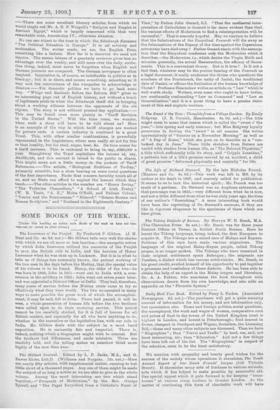The Hibbert Journal. Edited by L. P. Jacks, M.A., and
G. Dawes Hicks, Litt.D. (Williams and Norgate. 12s. net.)—Here are nearly fifty articles, with supplemental matter, running to but little short of a thousand pages. Any one of them might be made the subject of as long a notice as we are able to give to the whole volume. Among the most interesting are two which stand together,—" Prospects of Modernism," by the Rev. George Tyrrell, and " The Papal Encyclical from a Catholic's Point of View," by Father John Gerard, S.J. "That the mediaeval inter- pretation of Catholicism is doomed is far more evident than that the various efforts of Modernism to find a reinterpretation will be successful." That is scarcely hopeful. May we venture to believe that the fulminations of the Encyclical Pascendi will die away as the fulminations of the Papacy of the time against the Copernican astronomy have died away ? Father Gerard starts with the assump- tion that the Encyclical condemns only the Modernism which it describes,—the Modernism, i.e., which denies the Virgin Birth and miracles generally, the actual Resurrection, the efficacy of Sacra- ments. This is a convenient theory. But is it true ? Is it not a fact that, whatever may be the precise bearing of the Pascendi as a legal document, it really condemns the divine who questions the numbers of the Pentateuch, the unity of Isaiah, the traditional date of Daniel, or affirms the limitation of the human knowledge of Christ ? Professor Hearnshaw writes an article on " Law " which is well worth study. Writers, even some who ought to know better, are continually confounding " Law as Command" and "Law as Generalization," and it is a great thing to have a precise state- ment of this and cognate matters.






































 Previous page
Previous page